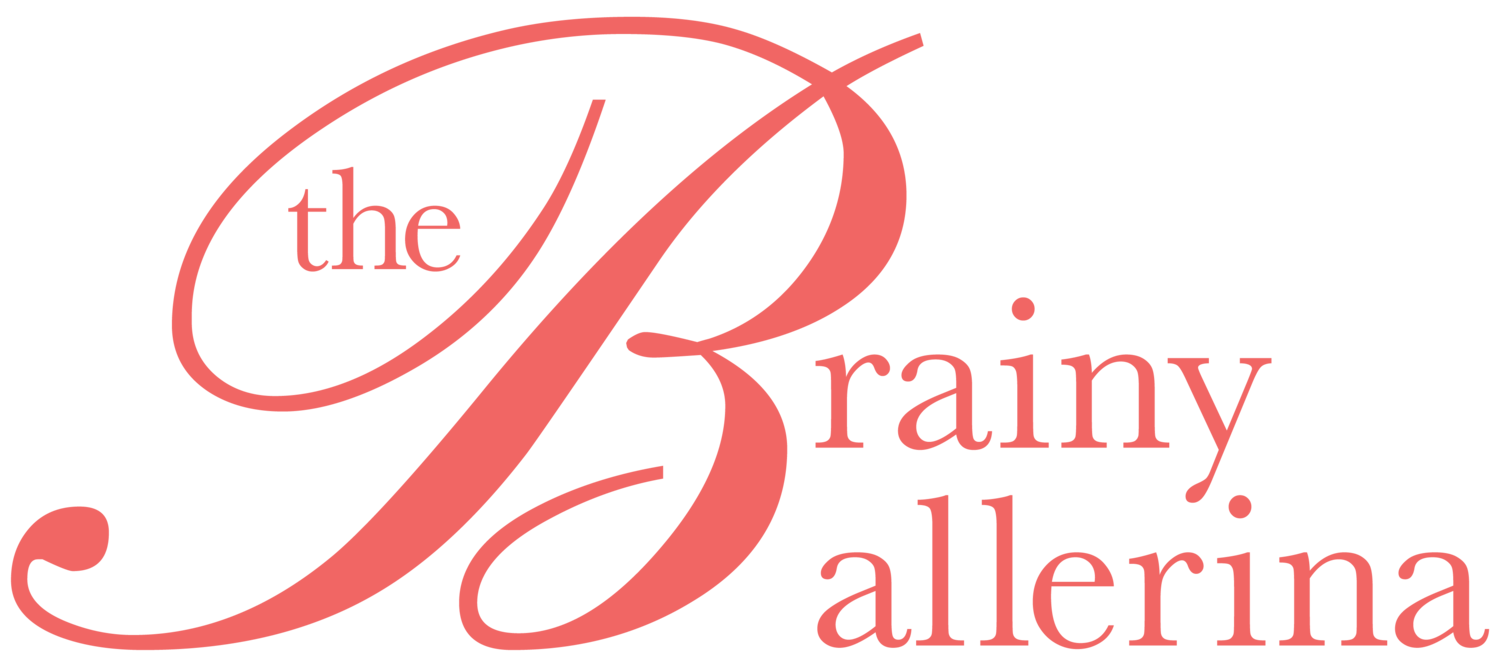How to Motivate Yourself Every Dance Class Using Thought Management
Most of my students have big dreams, and I encourage them to “dream big” and set exciting goals. Nonetheless, I sometimes find them tired and unmotivated at the beginning of class, despite their sincere, long-term goals. Their lives–schoolwork, daily class, rehearsals, etc. can feel overwhelming and exhausting. At this moment, I have two choices, I can become angry and frustrated with them, or I can help them. Of course, I choose to help them. I want to teach them to support themselves by using the power of their minds. Our human brains are powerful instruments that we can mobilize to help us take action toward our goals.
Below, you will find seven models of thought management I offer to students to help them feel determined, motivated, or at least willing to go for it during class.
Permit yourself to feel your feelings
First, permit yourself to feel whatever you feel, knowing that it is a sensation you are currently experiencing, but will not be experiencing forever. It’s OK to feel tired, overwhelmed, or frustrated on certain days. It’s even OK to feel unmotivated for the moment. Remind yourself that these feelings make you nothing less than HUMAN! If you are alive, you will experience all kinds of emotions. No single feeling defines you as a whole, nor will it be the end of you. Feelings, even negative ones, come and go. They are not permanent. (If you are experiencing extended sadness, anxiety, or depression, please seek the help of a mental health professional. This article refers only to the ordinary feelings of lack of motivation when trying to meet a goal.)
Remember your “why”
It is a common, albeit effective, prompt these days. Everybody talks about it, but how does it work in action? The first part of this method is remembering those early days–when and why you started dancing and how it made you feel when you first decided, “Yes! This is the life for me!” Recalling that moment and allowing yourself to feel all those feelings will bring on positive feelings–passion, drive, power, energy, etc. Those positive feelings are your FUEL! Use them like a power outlet. Plug into them and invigorate yourself to work and focus during today’s class.
Use visualization
Visualize yourself in the future, having met an enormous goal. How do you act? How do you move? How do you speak? How do you feel? Be that person in your mind. You are already there! Feel how amazing it feels to be living that dream goal. And boom! Additional positive feelings and even more fuel to move you through today.
Ask your future self
This “Future You” is also a source of wisdom. Ask them how they coped when they had days during which they felt dull or overwhelmed. What did they do on those days that brought them to the success they can now celebrate? You may get some answers that can help you get through today productively.
Accept your negative feelings without judging them
Don’t try to make them go away. Fighting against them can make you feel worse because guilt and frustration are added to the mix. Keep in mind that it is your brain’s job to have tens of thousands of thoughts per day, some true and some not true because it is only trying to keep you safe. Maybe your brain is telling you that you are too tired to take class. Maybe your brain is telling you that since you had a long day at school, you deserve to rest instead of taking ballet class. Give that part of your brain an identity–a toddler running around babbling panicky words, a cute monkey jumping up and down in alarm, etc. Make friends with that toddler or monkey, give them gentle hello or pat on the head, and thank them for their ideas, but you prefer to go another way today.
On a personal note, I do this daily. For example, my brain tells me every single morning that I don’t have time to brush my teeth and wash my face because doing those things will hamper my ability to accomplish the rest of my goals for that day. I will be late, and everything will go wrong. I immediately feel anxiety that I will never be able to get everything done. At that point, I visualize a young child with me telling these anxious thoughts, and I allow her to chatter and tell me all the worrisome, terrible things. Next, I suggest that we can try her way another time. But this morning, we will take the time to clean up properly, and we will be OK. This process has become automatic for me now, and I don’t have to work so hard to believe that I have time for my morning routine.
Name your feeling
Say to yourself, “I feel ______ right now.” You may not be able to make that feeling disappear quickly. Instead of fighting it, imagine that you have a small bag–maybe in your larger dance bag. It’s your “negative feelings bag.” Visualize taking that named feeling–literally the word itself and putting it inside your bag. It can go with you today, inside your bag. You may have to carry it around for a while, but it will not stop you from doing what you ultimately want. You are strong enough to carry that emotion around and take class simultaneously.
Pick three things to focus on
Pick three things: one technical, one artistic, and one personal, which you want to improve in this class. Today, you don’t need to focus on every single thing. You can focus exclusively on three things for this class. You can spend today’s class focusing on straight knees, expressing joy, and being alert. Or turnout, musicality, and determination. Or keeping your shoulders down, soft arms, and remembering your exercises. Give yourself permission to focus on three things today.
Experiment with these methods and use the ones that work for you. It’s NOT one size fits all. You may find one or two that work best for you. That’s enough. Utilize what works for you generously. And enjoy dancing!
AN IMPORTANT NOTE: These thought management methods are for use only when you are feeling an occasional lack of motivation or frustration with taking class. If you are physically injured or experiencing feelings of depression or anxiety in your daily life, please seek the advice of a medical professional.
Meet the Author
For over three decades, dancers under Deborah Engerman’s tutelage have gone on to earn professional contracts and danced with companies including American Ballet Theatre, Ballet Inc., Boston Ballet, Complexions Contemporary Ballet, Hubbard Street Dance Chicago, Nashville Ballet, Texture Ballet, Universal Ballet, the Vienna Opera Ballet, the Washington Ballet, and on Broadway. She has also coached dancers for numerous international competitions, such as the Prix de Lausanne, the Varna International Ballet Competition, and Youth America Grand Prix.
Mrs. Engerman toured Europe as ballet mistress for Rock the Ballet, of Sweetbird Productions. Back in the United States, she was director of the Maryland Classical Dance Academy at Centre Pointe Performing Arts and simultaneously trained students at Charm City Ballet, Dance Conservatory of Maryland, and Susquehanna Dance Center. Mrs. Engerman continues to contribute to the future of ballet by training dancers throughout Maryland and Pennsylvania. She lives with her husband and two canine companions in South Central Pennsylvania.
For more ballet wisdom, follow Mrs. Engerman on Facebook or Instagram @deborahengerman_balletteacher.
If you liked this post, you might also like:




